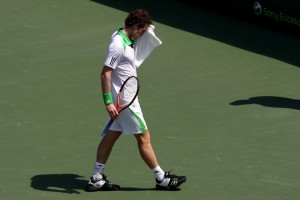By Mike McIntyre
After losing his third consecutive opening round match this past week in Miami, Andy Murray appears to be pushing the panic button. In an announcement confirmed earlier this week, the fifth ranked player in the world has parted ways with part-time coach Alex Corretja after a three year partnership.

While Murray is certainly in need of a shake-up, splitting with the former two-time French Open finalist as the clay-court swing approaches might not be the best move. Murray’s game transitions well enough on all surfaces, but clay is certainly his least favorite.
One rumor that surfaced shortly after the coaching split with Correjta was that former world No. 1 Ivan Lendl has made a pitch to become Murray’s next mentor. I cannot begin to describe what a terrible pairing that would turn out to be.
Aside from having absolutely no coaching experience, Lendl had been away from the tennis scene almost entirely since he retired. Back issues and a keen interest in golf have kept him off the court and we have not see him stay associated with the game in the same way guys like John McEnroe and Pete Sampras have. Simply put, Lendl is not in touch with the evolution the game has seen since he hung-up his raquet in 1994 nor does he have any input on today’s crop of current players on the ATP World Tour.
Furthermore, Lendl’s game itself is in total shambles as evidenced by his drubbing at the hands of an injured McEnroe at the end of February at the BNP Paribas Showdown at Madison Square Garden. After spraining his ankle in a pre-match warm-up, McEnroe was noticeably hobbling around the court and yet still managed to soundly defeat the out of form Lendl 6-3. A former eight time Grand Slam champion, Lendl could barely keep the ball in play.
While Murray is undoubtedly looking to discover the secret formula that would allow him to win his first major, he needs someone who can bring more to the table than an impressive resume from twenty-plus years ago on the tour. He needs someone with insight into the nuances that exist in today’s hard-hitting game. He needs someone who can offer sound scouting reports on all players within the top 150 in the rankings and someone who can put together tactical advice that can be practically implemented. Lendl, for all he accomplished during his career, is not that man.
Andy Murray can change coaches and bring in every former Slam winner who is still alive at the moment and it won’t make a bit of difference until he takes a long, hard look at himself in the mirror. It is time for a pulse-check in order to figure out if he has the drive to fight through these current obstacles and find a way to persevere against his biggest problem – himself.
Routed in three Grand Slam finals has undoubtedly taken it’s mental toll on Murray as he has been a total basket-case on the court since losing to Novak Djokovic in Melbourne in January. Always known as a monotonous bore during his press conferences, Murray is now starting to show the same lack of interest in his play on the court as well.
The three first round losses in-a-row to average players is inexcusable. Marcos Baghdatis defeated him in Rotterdam in early February 6-4, 6-1. Baghdatis had his best moment on the circuit five years ago when he made the Aussie Open final and has struggled with consistency and physical fitness ever since.
Murray was then beat 7-6, 6-3 by American phenom-in-stasis, Donald Young. It was arguably the victory of Young’s career as he has been nothing but unattainable hype ever since he broke onto the pro-tour a few years back.
The worst loss of all occurred this past week in Miami as Murray was knocked off by Alex Bogomolov Jr. by a score of 6-1, 7-5. Bogomolov is a 27 year-old journeyman who often finds himself playing on the challenger tour and should likely not even defeat Andy’s younger brother Jamie.
Murray can now move towards the clay-court season and hope that the change of scenery can kick-start a new chapter in his disappointing season. His record on the red-dirt was 7-4 a year ago, but he failed to advance past the quarter-finals of any of the four tournament’s he entered on the surface.
Unfortunately I predict another two months of misery for Murray before he can head home in June to face his critics in the United Kingdom prior to a Wimbledon that will likely bestow upon him the most challenging and bitter criticism he has had to face in his career thus far.
Will Murray be able to dig deep and and turn things around to silence his growing list of detractors or are we in for what could be a slow and painful collapse from a player who just doesn’t have the mental fortitude to make his stamp on the men’s game? Stay tuned, as not even Murray himself can give us an answer to that question at present time.
